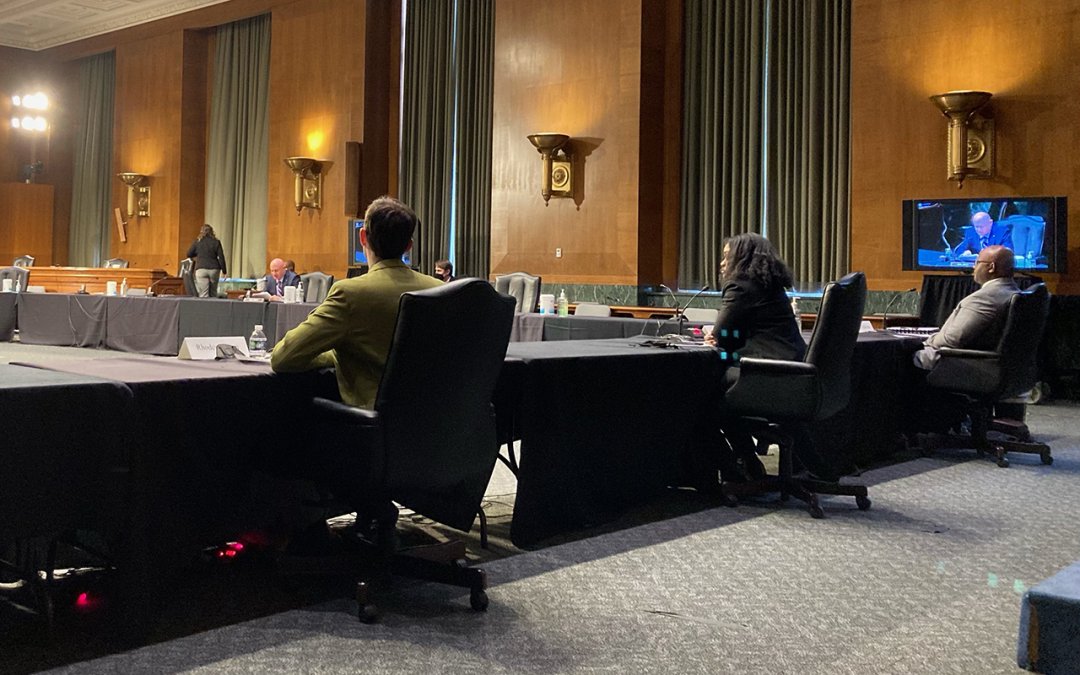WASHINGTON –– Increasing availability of composting and recycling programs benefits both the climate and economy, experts said Wednesday at a Senate Committee on Environment & Public Works hearing.
“The U.S. spends $218 billion a year, growing, processing, and transporting food that is not consumed,” said composting advocate Pashon Murray.
As the chief executive officer for Detroit Dirt — an organization recovering organic waste to produce compost for local urban farmers — Murray has led the effort to divert more than 90 million pounds of waste from landfills.
“Composting is actually helpful for soils, our urban landscapes, our water runoff, etc.,” she said. According to her, high rates of soil erosion and depletion have impacted harvest yields and lowered productivity.
The Senate hearing addressed two pieces of drafted legislation meant to push for concrete steps following last November’s significant allocation of funds to national recycling programs included in the bipartisan infrastructure bill.
Chairman Tom Carper’s Recycling and Composting Accountability Act, which the Delaware Democrat drafted alongside Sen. John Boozman (R-Ark.), seeks to improve the Environmental Protection Agency’s recycling and composting data collection.
The act calls on the EPA’s administrator to prepare an inventory of U.S. public and private materials recovery facilities, focusing in part on calculating the number of community curbside recycling and composting programs.
In the U.S., recycling and composting rates remain low, with the EPA reporting a rate of only 32% in 2017.
Nevertheless, ranking member Shelley Moore Capito (R-W.Va.) — who proposed a Recycling Infrastructure and Accessibility Act that would create a new EPA pilot program — said the recycling industry constantly “ebbs and flows” due to facilities’ capacities and municipal governments’ funds. This makes data ever-changing.
Sen. Sheldon Whitehouse (D-R.I.) pointed out industry inconsistencies that make improving recycling difficult.
“It’s cheaper to buy new levels of plastic and put out your single-use plastic items than to be able to buy recyclable plastic,” the Rhode Island Democrat said during the hearing. “We ought to be accountable for those, I would say, catastrophic failures verging on being a fraud on the public.”
The Inaccessibility Obstacle
The Recycling Infrastructure and Accessibility Act would create a new EPA pilot program aimed at increasing recycling’s accessibility in rural and disadvantaged communities.
Senators and experts alike agreed that expanding accessibility is key to increasing composting and recycling overall.
“Many Americans in disadvantaged communities want to recycle and compost, but are unable to do so because they live in neighborhoods that lack curbside pickup, bottle return, and other necessary recycling infrastructure,” Carper said.
Sen. Mark Kelly (D-Ariz.) asked Ben Harvey, who chairs National Waste and Recycling Association, to expand upon the costs these communities experience when faced with the hard decision to either ship recyclables far distances for processing or end recycling programs altogether.
“I think that the biggest issue facing us is certainly the cost to collect, transport, and process,” Harvey said.
He identified the “collapse” of the global recycling market following China’s decision in 2018 to set new purity standards, banning most recyclables from importation.
For decades, the U.S. sent millions of recyclables to China to be processed, but significant portions were contaminated and thus diverted to China’s countryside and oceans instead of being processed.
“There was no value in the materials that we were collecting,” Harvey said about this change. “We need the support of the federal government to come in and subsidize, maybe, in some of these situations where it’s costing the municipality too much money to transport and process those recyclables.”
Sen. Dan Sullivan (R-Alaska) emphasized the challenges of collection specifically in large geographic areas.
“My state is a very big state in terms of size, but with a pretty small population,” Sullivan said. “So far 70% of households do not have access to curbside recycling.”
Education can contribute to expanding access, Murray told the senator.
“Education is key in households, but also mandating the ordinances with the local government I think will be key,” she said.

